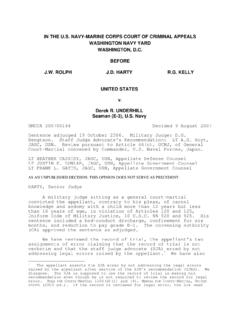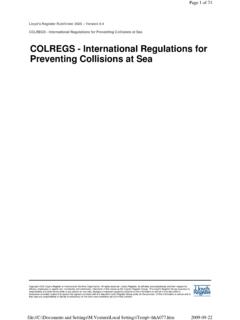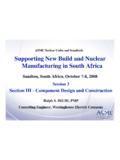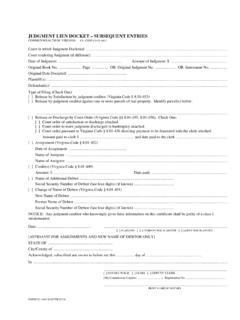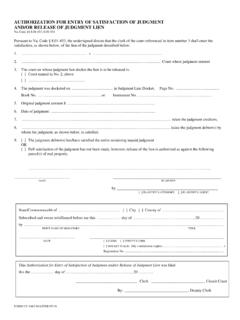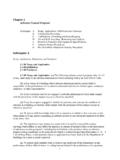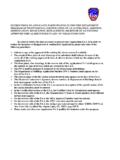Transcription of IN THE U.S. NAVY-MARINE CORPS COURT OF …
1 IN THE NAVY-MARINE CORPS COURT OF CRIMINAL APPEALS WASHINGTON NAVY YARD WASHINGTON, BEFORE WAGNER VINCENT STONE UNITED STATES v. Steven N. MENZER Corporal (E-4), U. S. Marine CORPS NMCCA 200501501 Decided 21 November 2006 Sentence adjudged 06 November 2002. Military Judge: Burnett. Review pursuant to Article 66(c), UCMJ, of General COURT -Martial convened by Commanding General, Training and Education Command, Marine CORPS Development Command, Quantico, VA. LT SOUDERS, JAGC, USN, Appellate Defense Counsel LT KYLE C. KNEESE, JAGC, USNR, Appellate Defense Counsel Capt ROGER MATTIOLI, USMC, Appellate Government Counsel AS AN UNPUBLISHED DECISION, THIS OPINION DOES NOT SERVE AS PRECEDENT. VINCENT, Judge: A military judge, sitting as a general COURT -martial, convicted the appellant, contrary to his pleas, of extortion in violation of Article 127, Uniform Code of Military Justice, 10 927.
2 The appellant was sentenced to confinement for five months, reduction to pay grade E-1, and a bad-conduct discharge. The convening authority (CA) approved the sentence as adjudged, except that, as measure of clemency, he reduced the period of confinement to three months. The appellant s sole assignment of error alleges excessive post-trial delay. We have examined the record of trial, the appellant s assignments of error, and the Government s response. We conclude that the findings are correct in law and fact and that there was no error materially prejudicial to the substantial rights of the appellant. Arts. 59(a) and 66(c), UCMJ. Our superior COURT has adopted a framework for analyzing post-trial delay, utilizing the four factor analysis of pretrial 2 delay established by the Supreme COURT in Barker v.
3 Wingo, 407 514, 530 (1972): (1) length of delay; (2) reasons for delay; (3) the appellant s demand for speedy review; and (4) prejudice. United States v. Moreno, 63 129, 135 ( 2006); see United States v. Jones, 61 80, 83 ( 2005); Toohey v. United States (Toohey I), 60 100, 102 ( 2004). These four factors are balanced, "with no single factor being required to find that post-trial delay constitutes a due process violation." United States v. Toohey (Toohey II), 63 353, 359 ( 2006)(quoting Moreno, 63 at 136). The absence of any one factor does not bar finding a due process violation. Moreno, 63 at 136. Turning to the facts of this case, we find that the delay of 1091 days to docket the record of trial with this COURT following trial is, on its face, unreasonable, triggering a balancing of the four Barker factors to determine if a due process violation has occured.
4 Toohey I, 60 at 103. Regarding the first Barker factor, we are highly concerned that after the military judge authenticated the record of trial on 16 April 2003, the Government made no attempt to initiate post-trial processing of the appellant s case until approximately 1 January 2005, a period exceeding 20 months. Moreover, once the Government initiated post-trial processing, it took an additional ten months to docket the case with this COURT . This factor weighs heavily in favor of the appellant. In addressing the second factor, we note, with considerable dismay, that the Government advances no reason for the period of delay between 16 April 2003 and approximately 1 January 2005. Concerning the period between 1 January 2005 and 6 June 2005, the Government contends that it experienced considerable difficulty in locating the appellant because he failed to keep his trial defense counsel apprised of his current mailing address.
5 Additionally, the Government asserts that, in early January 2005, the Marine CORPS Base (MCB), Quantico Defense Office refused to assign a substitute defense counsel until the Government located the appellant. The staff judge advocate s recommendation (SJAR) of 7 July 2005 outlines the Government s numerous attempts to locate the appellant, which included a review of Government records, internet searches, and an address check conducted by the Naval Criminal Investigative Service (NCIS). Furthermore, the SJAR indicates that, in response to a certified letter mailed to an address provided by NCIS, the appellant contacted the Government on 26 May 2005 and substitute defense counsel was appointed on 6 June 2005. The appellant s substitute defense counsel s clemency request of 7 September 2005 also indicates that the appellant contacted the Government on 26 May 2005 and was detailed a substitute defense counsel on 6 June 2005.
6 Curiously, however, the record of trial also contains correspondence indicating that a substitute defense counsel was appointed as early as 3 March 3 2005. See Senior Defense Counsel, Defense Section, Office of the Judge Advocate General, Marine CORPS Combat Development Command, MCB, Quantico, letter of 3 Mar 2005. The Government was responsible for providing a substitute defense counsel to the appellant and appears to have done so in early March 2005. The appellant s substitute defense counsel should also have made attempts to contact him and initiate post-trial representation as early as possible. See RULE FOR COURTS-MARTIAL 502(d)(6), MANUAL FOR COURTS-MARTIAL, UNITED STATES (2002 ed.), Discussion (E). We also note that the documentation in the record of trial addressing the appellant s appellate and post-trial rights does not require him to provide his detailed defense counsel and/or the Government a mailing address or any other contact information.
7 See Appellate Exhibit XII. Accordingly, we cannot conclude that the appellant was accountable for any of the delay incurred between January and May 2005. However, we recognize that the Government diligently attempted to assign substitute defense counsel and locate the appellant, and the substitute defense counsel did not immediately initiate post-trial representation. After considering the Government s reasons for the delay, we conclude that the period of delay between 16 April 2003 and 1 January 2005 weighs heavily in favor of the appellant and the period between 1 January 2005 and 1 November 2005, the date the case was docketed with the COURT , weighs slightly in favor of the appellant. Considering the third factor, we note that the appellant did not state his desire for speedy review until filing a clemency request on 7 September 2005, almost three years from the date of his sentencing.
8 Under the guidance of our superior COURT , we conclude that this factor weighs against the appellant, but under the circumstances of this case, not heavily. Moreno, 63 at 138; United States v. Harvey, 64 13, 36 ( 2006). The appellant addresses the fourth Barker factor in his brief by claiming prejudice solely due to the fact that he has not been issued a DD-214. However, he does not set forth factual matters in the record of trial to support his claim. We do not consider statements contained in appellate briefs that are not drawn from facts established in the record. Even assuming, arguendo, that we were to consider the arguments of counsel from the appellate brief as fact, the information is too speculative and is entirely insufficient to establish prejudice flowing from the delay.
9 See Jones, 61 at 85 (holding that unrebutted affidavits describing how the appellant s lack of a discharge certificate prevented him from being considered for employment established prejudice). The appellant raises no errors before us other than post-trial delay. There is no evidence, therefore, that he was prejudiced by suffering oppressive incarceration pending appeal. 4 Moreno, 63 at 139. Neither does the appellant demonstrate that he has experienced particularized anxiety or concern that is distinguishable from the normal anxiety experienced by prisoners awaiting an appellate decision such that he has suffered prejudice in the form of constitutionally cognizable anxiety. Id. at 140. Finally, the appellant has asserted no error requiring a rehearing, nor does he establish how he would be prejudiced by the delay in the event of a rehearing.
10 Id. The appellant has, therefore, presented no factual claim of prejudice suffered as a result of the delay. Balancing all four factors, we conclude that the circumstances of the delay in this case did not rise to the level of a due process violation and decline to grant relief. Although the first Barker factor, and significant portions of the second factor weigh in favor of the appellant, the delay is not "so egregious that tolerating it would adversely affect the public s perception of the fairness and integrity of the military justice system." Toohey II, 63 at 362. We next consider whether the delay affects the findings and sentence that should be approved in this case. United States v. Brown, 62 602 ( 2005)(en banc). At the outset of our analysis, we note that the convening authority, in an exercise of clemency based specifically on post-trial delay, reduced the appellant s period of confinement from five to three months.




